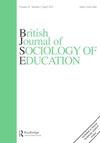Towards a Sociology of Educational ‘Ideal’: Powerful Knowledge, Knowledge of the Powerful, and Beyond
IF 2.1
3区 教育学
Q1 EDUCATION & EDUCATIONAL RESEARCH
引用次数: 0
Abstract
AbstractThis paper examines how the Durkheimian approach to the ‘ideal’ delineates a possible way of straddling the dilemma between the normative orientation of ‘powerful knowledge’ accounts and the critical orientation of ‘knowledge of the powerful’ accounts. It argues that the normative aims are embedded in the fabrics of the sociological description with which the Durkheimian notion of ‘elementary form’ is concerned. To see where this enterprise can lead, this paper turns to the sociology of education of Bourdieu and Bernstein. Both draw on Durkheim’s writings on primitive classifications in education and society, working towards uncovering the regularities of the world of knowledge classifications. Keeping in line with Bourdieu and Bernstein, this paper argues that one has to make the same refusal to the advocates of an abstract ideal of educational knowledge that is dissociated from its social conditions of historical realization in pedagogic contexts, and to the advocates of a cynical relativism of ideal that rejects any necessities socially established.Keywords: Basil BernsteinPierre BourdieuEmile Durkheimidealpowerful knowledgeknowledge of the powerful AcknowledgementThis paper is primarily based on my Ph.D. thesis which looks at Bernstein’s sociology of ‘boundary’ and its theoretical relationship to Durkheimian tradition. I need to thank Weihe Xie, who is the supervision of my Ph.D. thesis. I need also thank Michael Young, Johan Muller for tireless reading and discussion of this and other manuscripts.Disclosure statementNo potential conflict of interest was reported by the author(s).Notes1 At the 1977 Conference of Association Francaise des Enseignants de Francais, Bourdieu argued that ‘[o]ne of the principles of sociology is to challenge that kind of negative functionalism. Social mechanisms are not the product of Machiavellian intention. They are much more intelligent than the most intelligent of the dominant agents’ (Bourdieu Citation1993, 71).2 It was not until the end of the Middle Ages that intellectuals and academics shifted from ‘intellectual workers’ in the working world, to ‘hereditary aristocracies’ integrated into privileged groups (Le Goff Citation1993, 61, 124). Against this background, a significant evolution occurred: ‘knowledge became a possession and a treasure, an instrument of power and no longer a disinterested end in itself’ (126).3 ‘[P]edagogic work is that much closer to explicit pedagogy to the extent that it resorts to a greater degree of verbalization and classificatory conceptualization’ (Bourdieu and Passerson 1977, 48–9)Additional informationFundingThe funding for this study was provided by National Project for Education Sciences Planning (Project No.: EAA230469), Ministry of Education, China.走向教育“理想”的社会学:强大的知识、强大者的知识以及超越
摘要本文考察了迪尔凯姆的“理想”方法如何描绘了一种跨越“强大的知识”描述的规范性取向和“强大的知识”描述的批判取向之间困境的可能方式。它认为,规范的目标嵌入在社会学描述的结构中,而迪尔凯姆的“基本形式”概念与之有关。为了探究这一事业的走向,本文转向布迪厄和伯恩斯坦的教育社会学。两者都借鉴了迪尔凯姆关于教育和社会的原始分类的著作,致力于揭示知识分类世界的规律。与布迪厄和伯恩斯坦保持一致,本文认为,人们必须同样拒绝教育知识的抽象理想的倡导者,这种理想与教育背景中历史实现的社会条件相分离,以及拒绝任何社会建立的必需品的理想的愤世嫉俗的相对主义的倡导者。关键字:巴兹尔·伯恩斯坦皮埃尔·布迪厄埃米尔·迪尔凯姆理想的强大的知识强大的知识承认本文主要基于我的博士论文,它着眼于伯恩斯坦的“边界”社会学及其与迪尔凯姆传统的理论关系。我要感谢我的博士论文导师谢伟和。我还要感谢Michael Young和Johan Muller,他们孜孜不倦地阅读和讨论了这份手稿和其他手稿。披露声明作者未报告潜在的利益冲突。注1在1977年的法兰西协会会议上,布迪厄认为,“社会学的原则之一就是挑战那种消极的功能主义。”社会机制不是马基雅维利式意图的产物。他们比最聪明的主导主体更聪明(Bourdieu citation, 1993,71)直到中世纪末期,知识分子和学者才从劳动世界的“知识工作者”转变为融入特权群体的“世袭贵族”(Le Goff citation1993,61,124)。在这种背景下,发生了重大的演变:“知识成为一种财产和财富,一种权力的工具,而不再是一个无私的目的”(126)。3“教育学的工作更接近于显性教育学,因为它采用了更大程度的语言化和分类概念化”(Bourdieu and Passerson 1977,48 - 9)。国家自然科学基金资助:EAA230469)。
本文章由计算机程序翻译,如有差异,请以英文原文为准。
求助全文
约1分钟内获得全文
求助全文
来源期刊
CiteScore
3.70
自引率
9.50%
发文量
74
期刊介绍:
British Journal of Sociology of Education is one of the most renowned international scholarly journals in the field. The journal publishes high quality original, theoretically informed analyses of the relationship between education and society, and has an outstanding record of addressing major global debates about the social significance and impact of educational policy, provision, processes and practice in many countries around the world. The journal engages with a diverse range of contemporary and emergent social theories along with a wide range of methodological approaches. Articles investigate the discursive politics of education, social stratification and mobility, the social dimensions of all aspects of pedagogy and the curriculum, and the experiences of all those involved, from the most privileged to the most disadvantaged. The vitality of the journal is sustained by its commitment to offer independent, critical evaluations of the ways in which education interfaces with local, national, regional and global developments, contexts and agendas in all phases of formal and informal education. Contributions are expected to take into account the wide international readership of British Journal of Sociology of Education, and exhibit knowledge of previously published articles in the field. Submissions should be well located within sociological theory, and should not only be rigorous and reflexive methodologically, but also offer original insights to educational problems and or perspectives.

 求助内容:
求助内容: 应助结果提醒方式:
应助结果提醒方式:


